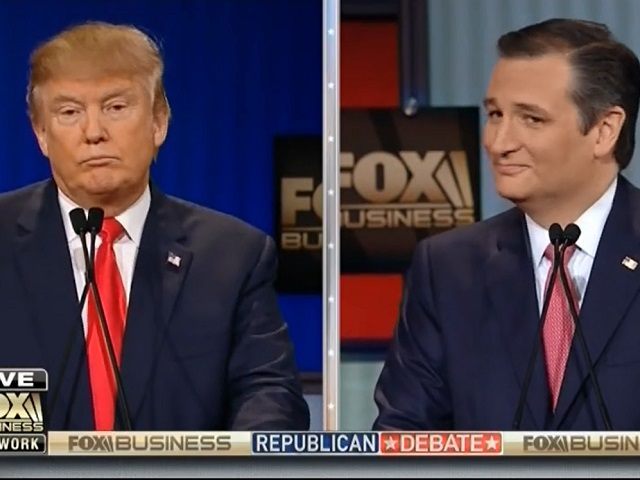Republican frontrunner Donald Trump has launched into a full-scale attack on Sen. Ted Cruz (R-TX), the only candidate who had, until now, escaped Trump’s scorn and outrage.
The attacks followed the pyrotechnics between Cruz and Trump at the last Republican debate, in which Cruz smacked Trump around for questioning his presidential eligibility, and Trump smacked Cruz around for suggesting that Trump represented “New York values.”
Over the weekend, a crowd in South Carolina booed Trump for questioning Cruz’s eligibility – but that didn’t stop Trump from slamming Cruz over his connections with Goldman Sachs: “How do you control … these big powerful banks, you’re a senator and yet you owe them money with a personal guarantee?” Trump continued by saying that Goldman “owns” Cruz.
Meanwhile, in South Carolina, Cruz blasted Trump’s alleged non-conservatism, stating, “Donald’s record does not match what he says as a candidate. It seems Donald has a lot of nervous energy. For whatever reason, Donald doesn’t react well when he’s going down in the polls.”
Trump’s assault on Cruz escalated on ABC’s This Week with George Stephanopoulos, where Trump declared Cruz “a nasty guy,” adding:
He was so nice to me. I mean, I knew it. I was watching. I kept saying, “Come on, Ted. Let’s go, okay.” But he’s a nasty guy. Nobody likes him. Nobody in Congress likes him. Nobody likes him anywhere once they get to know him. He’s a very – he’s got an edge that’s not good. You can’t make deals like that, and it’s not a good thing. It’s not a good thing for the country. Very nasty guy.
So, who’s likely to come out on top of this tiff?
To answer that question, we have to examine the strategic alliance – and now the break between – Trump and Cruz. Whom did it serve? Why did they engage in that alliance in the first place?
Cruz. Cruz tied himself strongly to Trump from the outset of the campaign because he wanted to demonstrate that he understood the anger of the public at both establishment Republicans and the media. He picked up on the fact that Trump had a unique capacity to capitalize on and channel that anger, and he didn’t want to undercut those feelings of anger by taking on Trump directly. He was never going to run through the entire primary process without coming into conflict with Trump; it was only a matter of time. But he also wanted to wait until Trump attacked him so it wouldn’t appear as though he had joined the establishment in attempting to take the steam out of a righteously angry Republican movement. He succeeded in achieving precisely that goal when Trump turned on him as Cruz rose in the polls. That’s why Trump’s birther attacks on Cruz backfired on him so dramatically. If Cruz overdoes his attacks on Trump’s conservatism, however, he risks alienating some of Trump’s conservative supporters, who believe that Trump’s recent brand of conservatism represents a heartfelt change rather than a switch in time.
Trump. Trump didn’t attack Cruz early on because he didn’t need to do so. He also understood that Cruz remained the most consistent conservative in the race, and that Cruz attacking him from the right could damage him. He couldn’t be damaged by Rubio, since he campaigned to Rubio’s right on immigration; he couldn’t be damaged by Jeb Bush or Chris Christie or John Kasich for the same reason. He could be hurt by Cruz – and so the Cruz-Trump alliance of convenience was born. But Trump couldn’t help but attack Cruz when it became clear that Cruz had a solid ground game in Iowa. And his attacks came on the wrong grounds – not grounds of policy or populism, but eligibility. That ticked off conservatives who believe that Cruz is the most conservative person in the field, and shouldn’t be thrown out for ancillary reasons.
Trump’s new attacks on Cruz’s association with Wall Street could be more successful, but Trump has to center on them instead of attacks that seem personal rather than political in nature – and Trump is vulnerable to Wall Street-insider charges just as much as Cruz is.
So, how does all of this play out? It depends on who can control his temper better. Cruz’s targeted attacks on Trump could work to his advantage, particularly in South Carolina and the South. Trump’s attacks on Cruz could work to his advantage among blue collar voters if he can show a hint of deliberateness. But as this campaign becomes a two-man race to the finish, the better strategist has the advantage.
Ben Shapiro is Senior Editor-At-Large of Breitbart News, Editor-in-Chief of DailyWire.com, and The New York Times bestselling author, most recently, of the book, The People vs. Barack Obama: The Criminal Case Against The Obama Administration (Threshold Editions, June 10, 2014). Follow Ben Shapiro on Twitter @benshapiro.

COMMENTS
Please let us know if you're having issues with commenting.